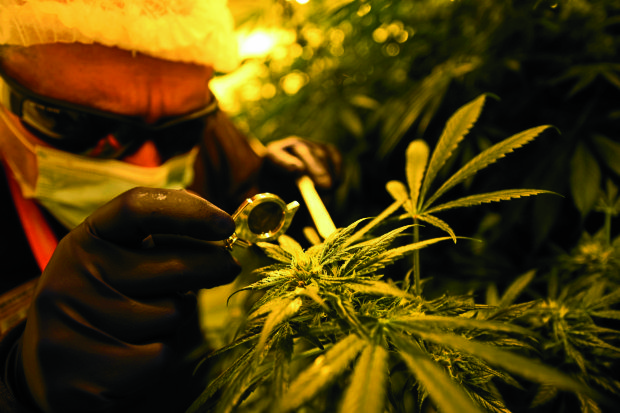Italy’s military ‘narcos’ cook up cannabis cures

MEDICAL USE The Italian military’s Cannabis Project Team is growing marijuana for medical use at the Chemical and Pharmaceutical Institute in Florence. —AFP
FLORENCE, ITALY—It’s every stoner’s nightmare: marijuana plants as far as the eye can see and not a spliff in sight.
“No, I have never tried it and I don’t have any intention of trying it either,” says Antonio Medica, the colonel in charge of the Italian military’s cannabis laboratory in Florence.
As he inspects pristine plant buds destined to be cut and dried into a version of the drug for medical use, the veteran officer is nonetheless sure he is producing some really good stuff.
“Absolutely yes, I can assure you of that,” says Medica, who is wearing surgeon’s scrubs over his uniform. “We have done the tests.”
In the doorway of a growing room that resembles a cross between a science lab and a steamy greenhouse, Medica explains how he ended up producing top-grade weed for Italy’s health service.
Article continues after this advertisement“One of my colleagues was joking with me the other day: ‘We spent 40 years trying to stop the troops smoking it in the barracks and now we are producing it ourselves,’” he said.
Article continues after this advertisementIn reality, it is a serious business. The quality has to be reliable because the output from the military’s Cannabis Project Team is destined for patients, not potheads.
Not so high
“Producing in this sterile, sealed environment is very important,” Medica explains.
“That is the only way you can ensure a consistent product and one free from the toxic materials, particularly heavy metals like mercury, that the plants can easily absorb when grown in fields.”
The first batches of made-in-Italy pot have just arrived in pharmacies.
Its production is just one of the activities of the military’s 164-year-old chemical and pharmaceutical institute (ICFM). The body prides itself on the fact that its cannabis was registered as a pharmaceutical product by Italy’s medicines agency in September 2015.
As such, it is very different from most of the cannabis consumed around the world.
This is because the component that gets recreational users high, tetrahydrocannabinol (THC), is less useful to doctors than another active ingredient, the anti-inflammatory cannabidiol (CBD).
In simple terms, Italian military dope has less THC but more CBD, compared with its street-bought equivalent, or even when compared with the legal, Dutch-made supplies on which Italian physicians previously relied.
An estimated 2,000 to 3,000 Italians currently use medical cannabis for purposes such as relief from multiple sclerosis pain or combating nausea after chemotherapy.
Medical ‘munchies’
Italy’s guidelines also highlight its possible use for glaucoma and in helping to restore the appetite of anorexia and HIV patients.
The latter application depends on the same reaction that recreational marijuana users experience when they get the “munchies.” Italy authorized the consumption of cannabis for medical reasons in 2007.
But take-up has been slow with doctors reluctant to consider it an option because of uncertainty over the circumstances in which it can be used, dosages and how to administer it.
“They were afraid of side effects, afraid to take the responsibility, afraid about everything,” said Pierluigi Davolio, a Florence pharmacist.
Davolio estimates he is now dispensing around 300 cannabis preparations per year as awareness and confidence grows among medics and patients, some of whom would have previously risked self-medicating with dealer-supplied or homegrown stocks.
He has no doubt that cannabis has its place on his shelves.
“One thing it works well for is fibromyalgia, a condition for which there is no really effective medicine,” he said, referring to a disorder that causes joint pain.
“We had a patient here who had sold her car because she was in too much pain to be able to drive. As soon as she started (taking cannabis), she was back at the garage saying she needed it back.”
With 100 plants yielding eight kilogram of final product, the ICFM plans to have four growth chambers on stream soon and to produce around 100 kg in total this year. —AFP